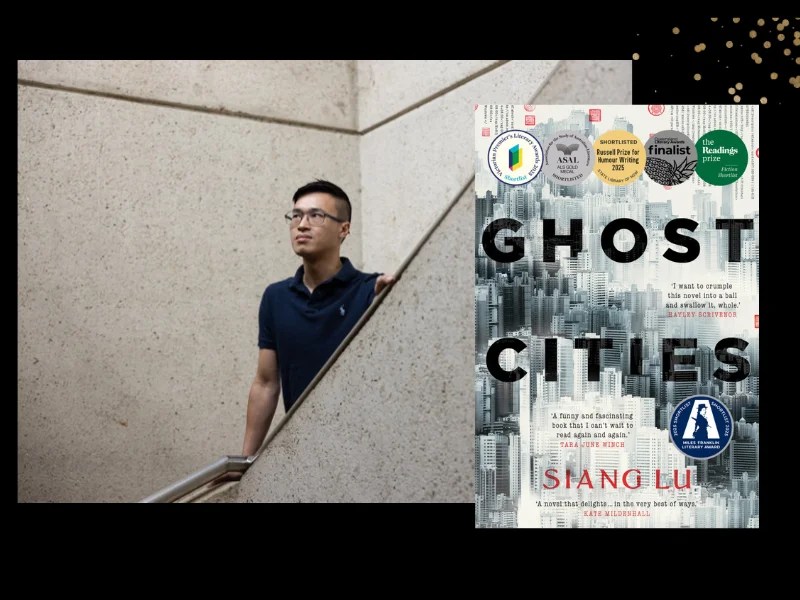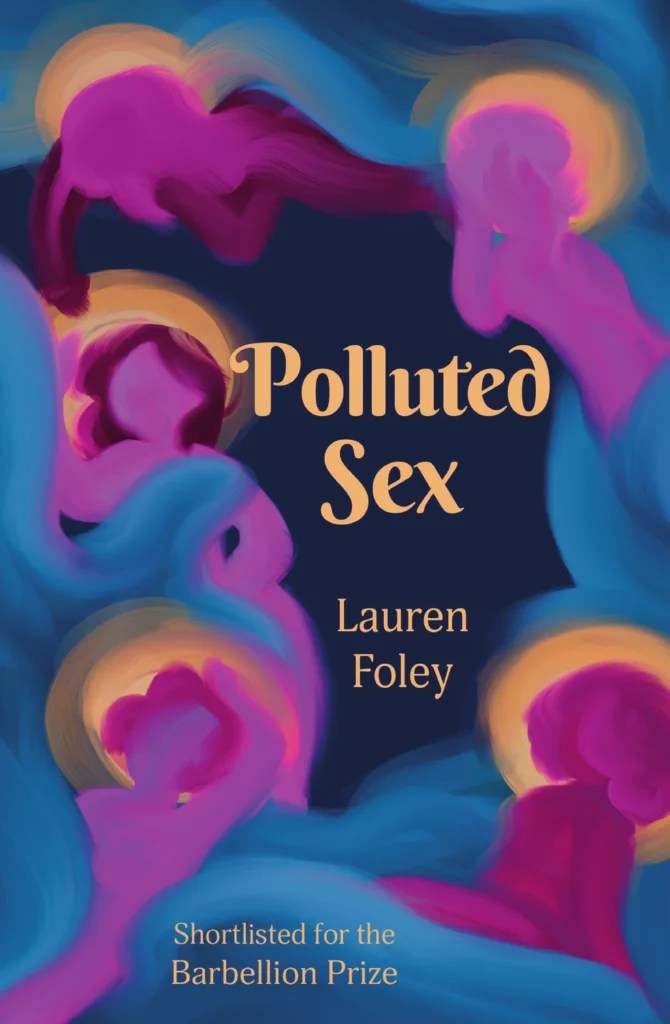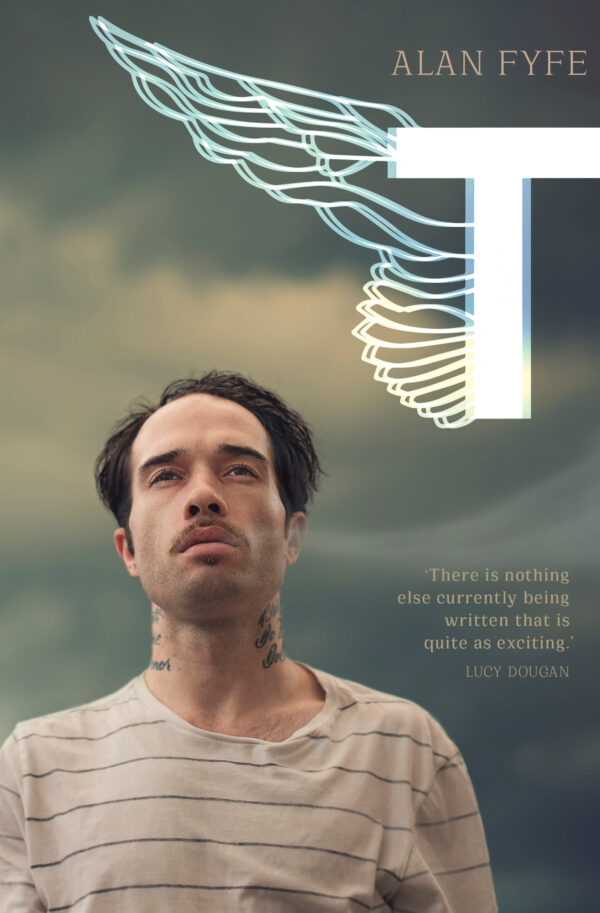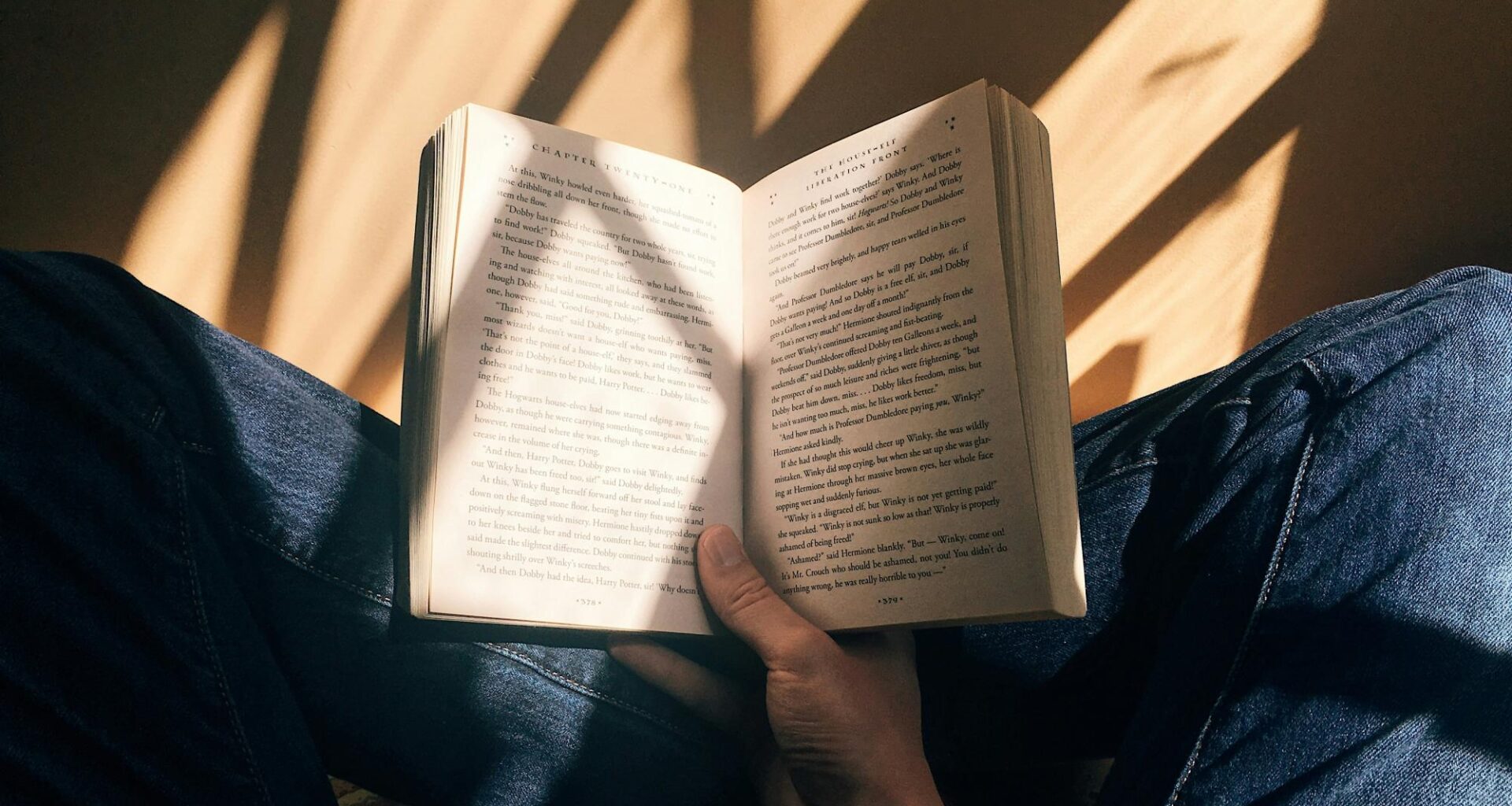The publishing world was agog to learn that this year’s Miles Franklin winner, Siang Lu, was rejected multiple times for his novel, Ghost Cities, before it was finally picked up. It took 10 years for Lu to have his manuscript published. Alongside other authors, he spoke to ArtsHub about his convoluted journey to publication.
Publishing after book rejection: quick links
Siang Lu: publishing after book rejection
‘Yeah. I tried to do it the right way. I approached Australian agents first for the Australian market, but I didn’t have any takers, at which point I then went to the American market. All up I asked about a dozen agents in Australia and about 150 agents in the United States for representation and ended up with one of the US ones, who then forwarded the manuscript to 40 to 50 trade publishers in the States, and none of them wanted to publish it.’
 2025 Miles Franklin winner Siang Lu. Publishing after book rejection.
2025 Miles Franklin winner Siang Lu. Publishing after book rejection.
Ghost Cities was eventually published by Australian’s UQP. It was the right choice for them because, as Lu points out, they’d published his previous book, a debut called The Whitewash in 2022.
‘We already had a good working relationship, and it helped that the book eventually won best audio at the Australian Book Industry Awards (as well as being shortlisted at the NSW Premier’s Literary Awards).’
‘What I found in publishing is that when you get your foot in the door, it’s a little easier, since people know you and they know that you’re capable of good work. In retrospect it was absolutely the right time to submit Ghost Cities to UQP.’
ArtsHub: Miles Franklin winner 2025: Siang Lu, Ghost Cities
For writers who are struggling to find a home for their manuscripts and face seemingly relentless rejection across the board, Lu says: ‘I think you have to derive an inner validation. And that’s a very difficult thing because we are waiting for someone to anoint us and tell us, “OK, the thing that you’ve written is worthwhile”. That’s the external validation. That’s wonderful when you get it, and it’s difficult for me to say this, but you have to be able to recognise your own value from within.’
Lu did not give up. Why such perseverance? Because he believed in his work, and to him to not write was an unfathomable concept.
The numbers cited by Lu may be on the extreme side, but many other authors have also faced multiple rejections from agents and publishers, before their manuscript was accepted. Here are some of their stories:
Lauren Foley: publishing after book rejection
On her award-winning experimental short story collection Polluted Sex, Lauren Foley tells ArtsHub: ‘Initially the manuscript went out on submission (UK, Ireland and North America) as a book of monologues written as short stories.
‘This perplexed the industry entirely. It was turned down by every major publisher. One publisher trashed it completely. Other than that I received complimentary, if not glowing, rejections: 28 of them. (As a side note: If work is good, why not publish it? Do marketing departments truly matter to literature this much!?)
 Polluted Sex by Lauren Foley. Publishing after book rejection.
Polluted Sex by Lauren Foley. Publishing after book rejection.
‘When Influx Press (northern hemisphere) offered to publish the manuscript as dramatic short stories for ease of trade categorisation and marketing I decided it would be better for the book to be published and read than for it to sit on my laptop in perpetuity.
‘Following its release in Europe, my completed book was sent on submission to ANZ where MidnightSun Publishing offered to publish the book. Polluted Sex is currently distributed worldwide thanks to both of them.
‘Without the existence of these two independent presses my manuscript could have died. Experimentation rarely gets published in literature. This is the state of our industry, and it is a very sad state altogether.’
Maggie Jankuloska: publishing after book rejection
Maggie Jankuloska too, persisted despite many setbacks: ‘My debut children’s novel The Rat-Catcher’s Apprentice was published in 2022 by MidnightSun Publishing. By the time I received a phone call acceptance, I was jaded and ready to bury that manuscript. I was rejected by every publisher and agent in Australia. I didn’t have much luck with overseas agents and publishers also, so all in all I probably received about 100 nos until I got one YES!
‘As a writer, my confidence took a beating, especially being a writer of a CALD background. My parents even suggested submitting under an Anglo surname, but I could never do that. It’s important to know your worth even when others don’t see it. Once my book found a home, all the rejections no longer mattered, they were just noise.’
Scarlett Harris: publishing after book rejection
‘My book, A Diva Was a Female Version of a Wrestler: An Abbreviated Herstory of World Wrestling Entertainment, is about an extremely niche topic, hence most mainstream agents and publishers didn’t think there was a place in the marketplace for it,’ explains Scarlett Harris.
‘I queried roughly 100 agents over a year and a half period before finally submitting to my publisher, Fayetteville Mafia Press, which accepted it unagented.
‘I persisted because it was a topic that I was passionate about and the publishers were really easy to work with, however it was a lot of work for very little monetary gain so I wouldn’t do it again! That said, I have queried additional books with agents and have been met with similar rejections, though probably fewer than 100!’
Katrina Cosgrove: publishing after book rejection
Katrina Cosgrove’s path was similarly long but ultimately fruitful: ‘I was rejected by every major Australian publisher for my novel Bone Ash Sky, as well as US publishers, including Knopf, after a year of them holding the manuscript and wanting substantial changes.
‘It was also rejected by Turkish and Israeli publishers who said they didn’t want controversy. It was finally picked up by Hardie Grant in Australia and the UK and also translated and published in Greece by Govostis’.
Alan Fyfe: publishing after book rejection
Alan Fyfe counted 43 rejections, both Australian and international, for his first novel, T. ‘The novel was ambitious: a post modern structure with shifting points of view and a multi-modal exposition technique. I entered it in a manuscript competition and was shortlisted in 2018. I thought I had sealed the deal on the first attempt. I hadn’t.
‘The first publisher I worked with wanted it less dark and to have a different ending. I rewrote the manuscript according to some of the publisher’s recommendations, but I had a strong instinct that there were certain things that couldn’t be changed, or the book would be worse for it. The publisher and I parted ways.
‘I then got the interest of a second publisher who asked me to limit the novel to a single protagonist’s point of view. I rewrote again and was accepted. Then the publisher lost funding but left me with an encouraging message that I should seek out another press, because they thought the book was important. A little encouragement is a powerful thing for a writer.
 T, by Alan Fyfe. Publishing after book rejection.
T, by Alan Fyfe. Publishing after book rejection.
After he pitched to major publishers (and their affiliates) without success, Fyfe turned to a publishing consultant for tips and ‘became fairly numb to rejection.’
T eventually found a home at Transit Lounge: ‘I held onto the most important elements of the book and refused to change them to please a publisher. I know writers who have gone the other way and feel like they have published soulless works they’ll never be happy with.’
‘I don’t know what the lesson is from all this. So many knock-backs did make me doubt that I was doing anything worthwhile, but I guess I had enough ego and, importantly, enough evidential feedback to encourage me to keep going. But that’s the wager, isn’t it? Maybe stuff gets rejected because you’re really not that good. Maybe the industry really does pass over great work regularly. I can’t speak for everyone and everything.
Read: Sydney Writers’ Festival partners with State Library of NSW for new literary hub
‘What I do know is that I enjoy these stories of authors who ploughed on through rejection after rejection and received acclaim on publication’ Fyfe continues.
‘I know that I’ve read authors who get their opportunities easily and quickly, through networks or the inevitable cliques of literature and that, often enough, their work is trash. I also tend to read those works with these long and tortured rejection stories attached to them, and I haven’t read one yet that I didn’t enjoy greatly.’
Discover more screen, games & arts news and reviews on ScreenHub and ArtsHub.

